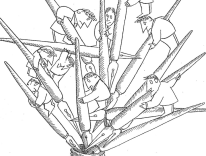The main theme of this book is easily stated: a healthy democracy requires abundance and steady growth, while scarcity, whether natural or the man-made byproduct of muddled policy, can pull a democratic polity into the slough of despond. For a long time following World War II, America basked in the politics of abundance; a widely shared prosperity helped lubricate our multiracial, multi-ethnic, class-stratified republic, reducing democratic frictions and exerting a calming effect on social relations. But that extended moment of bliss passed some time ago, in case anyone needs reminding. And if we are not already in that slough of national despond, Thomas Edsall believes, we are clearly headed there.
In the slough there be dragons and misery to spare. During prolonged hard times, people begin to doubt fundamentals and fear the worst. Might arrangements backed by the full faith and credit of the government of the United States, once thought to be sacred bonds, turn out to be no more trustworthy than the pension and health-care promises made to so many employees of once-great American corporations now busy trying to dump the “legacy costs” of yesterday’s contracts? Could the same thing happen with our national social contract?
The answer, The Age of Austerity is at pains to make clear, is yes. The vision of social attenuation and intractable political conflict that Edsall lays out is a dark and Malthusian one. Amid scarcity, he shows, the political culture begins to falter. Clashes intensify in an unseemly scramble for tax breaks and benefits built up in more buoyant days. Haves and have-nots are at sword-point. To oversimplify (something Edsall himself is careful not to do), the politics of scarcity pits taxpayers against tax-eaters—hardworking, self-reliant, “can-do” Americans against the champions of the poor and the shrinking middle class, who denounce selfishness and call for a helping hand for the needy while reminding us that there, but for the grace of God, go we.
Rush Limbaugh ridicules this liberal side as the “coalition of the screwed”—rhetoric that both reflects and deepens our partisan political divide. As life coarsens in the nation’s capital, politics inexorably becomes a very high-stakes game. It is a game run by spin doctors, political admen, and other operatives devising what Edsall calls the “coded” messages of the air wars, a multimedia rhetoric complete with sound tracks, snarky “gotcha” humor, fetching imagery, and reassuring voiceovers—all tailor-made for the limited attention spans of busy, distracted audiences. In the covering fog of professionally designed and administered populist rhetoric, both left-wing and right-wing, the parties fight to pick winners and losers. Meanwhile the serious business of governing, as opposed to campaigning, is left adrift.
It isn’t a pretty picture. And this is not mock combat; the stakes are all too real. Indeed, Edsall writes, politics amid scarcity is a “death struggle” in which opposing coalitions fight “to protect the benefits and goods that flow to their respective bases, each attempting to expropriate the resources of the other.” Both parties have veto power and find themselves at about equal strength. Political discourse amid this resource competition presents not a referendum on policy but a scramble for troops. The GOP, for instance, fears that having more citizens dependent on government programs means more Democrats in the future—and the certain weakening of their own shaky coalition, which now relies heavily on the allegiance of the majority of the white working class. Thus the ferocity of the fight over Obamacare.
This is the arena in which our politicians have slugged it out since the 2010 Tea Party takeover of the House of Representatives. And while most of us hope for a reasonable compromise, there are good reasons to doubt one is likely anytime soon. It is hard to be reasonable in a death struggle. And anyway, compromisers on both sides have been pretty much weeded out. In this year’s installment of what has come to be a permanent campaign, we will see appeals for all of us to get over our partisan spites and come together—and promises of semi-magical powers of leadership to help us do it. ’Tis a consummation devoutly to be wished, yet a highly unlikely one. And though his heart is with the other side, Edsall shows why scarcity in the long run favors the political right, which is better organized, more disciplined, and “better equipped ideologically than the left to inflict the hardship measures a sustained economic crisis invites.” The result, Edsall fears, is that “a brutish future stands before us.”
Thomas Edsall is one of our very best political writers, and The Age of Austerity offers readers a prudent prose style and a text festooned with charts and graphs that cast light on a tightening noose of scarcity, revealing where the benefits go, where the revenues come from, and other related questions. Edsall’s comprehensive answers make clear just how selective and misleading the coded messages of the political air wars are. Those messages are not intended, after all, to educate, but to reinforce and mobilize. Edsall, on the other hand, wants to educate, and he has much to teach. His gloomily informative book leaves little doubt that our civil religion, always a bit vague in doctrine and sloppy in theology, will be put to the test on our coming pilgrimage through the slough—and that, for many, the faith will flicker.


